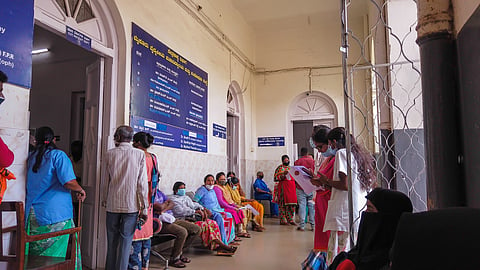WAAW 2024: Kerala’s ‘Smart Antibiotic Hospital Initiative’ is a multi-faceted approach to prevent antimicrobial resistance
“The time may come when penicillin can be bought by anyone in the shops. Then there is the danger that the ignorant man may easily underdose himself and by exposing his microbes to non-lethal quantities of the drug make them resistant.”
The above mentioned quote, authored by Alexander Fleming, doesn’t seem to have aged well. Fleming, the renowned microbiologist and the discoverer of world’s first antibiotic, the penicillin, said so as part of his lecture during his acceptance of the Nobel Prize for his pioneering achievement.
What he prophesied came true.
Through unscrupulous actions, we have squandered away all most all antimicrobials and are staring at a post antibiotic era.
Antimicrobial resistance (AMR) is one of the most pressing global health challenges of the 21st century. AMR threatens to undo decades of medical progress, rendering many of the common treatments and procedures, such as surgeries, cancer treatments and organ transplants, far riskier and less effective.
The efficacy of antimicrobials is declining rapidly, alongside the emergence of pandrug resistant bacteria and uncontrolled dissemination of antibiotic resistant genes in non-clinical environments.
AMR does not only affect individual health but also has serious implications for public health systems worldwide. The problem is compounded by the fact that the development of new antibiotics and other antimicrobials has slowed dramatically, making it even more critical to prevent resistance from spreading.
Therefore, preventing AMR is not just a scientific challenge but also a moral imperative for safeguarding public health globally. This article outlines the concept of the ‘Antibiotic Smart Hospital Initiative’ — one of the key people-centered strategies adopted by the Kerala government for preventing AMR .
Antibiotic Smart Hospital Initiative (ASHI)
The Kerala government, as part of KARSAP [Kerala Antimicrobial Resistance Strategic Action Plan], took an important step in preventing AMR by launching ASHI and participatory antimicrobial stewardship.
ASHI is based on the concept that effective stewardship initiatives adopt the theragnostic model of combining antimicrobial stewardship with infection prevention and control and diagnostic stewardship. ASHI is part of the Antibiotic Literate Kerala Campaign (ALKC) which aims at engaging all stakeholders including the public in AMR mitigation efforts.
Through ASHI, Kerala has carved a template to address all strategic priorities under KARSAP.
These hospitals are actually healthcare institutions which adopt and execute a pragmatic model of antimicrobial and diagnostic stewardship while ensuring compliance with standard IPC practices.
Each of these hospitals in local self government bodies [LSGD] like panchayats act as a constant source of continuous IEC [Information, education, communication] activities to healthcare workers and public thereby fostering participatory stewardship.
Antibiotic smart primary care institutions act as the pivot and nidus for community engagement at the grassroot level.
The criteria for qualifying for the status of antibiotic smart hospitals are different for primary, secondary and tertiary care institutions based on the patient profile to which they cater and available resources.
The criteria to be satisfied have been issued as two government orders to foster uniformity and standardisation across hospitals.
The table below highlights the criteria to be satisfied by hospitals in each tier to be declared as antibiotic smart. Primary care hospitals should satisfy 10 criteria and secondary/tertiary care hospitals should satisfy 15 criteria. For primary care, 95 per cent of antibiotics used in outpatient departments [OPD] should be from the access category whereas for secondary care it is 90 per cent and tertiary care 85 per cent.
Criteria for Antibiotic Smart Hospitals at each tier of health care
As of now, two family health centres in Kerala [FHC Kakkody and Ozhalapathy] have been lauded with the status of being antibiotic smart hospitals. The remaining hospitals in the state are expected to become antibiotic smart in a time sensitive manner.
A colour grid based on a scoring system has been designed to assess the number of criteria achieved by each hospital in the state in its progress towards attaining antibiotic smart status.
Preventing antimicrobial resistance is a multifaceted challenge that requires coordinated action at local, national, and international levels. Optimising the use of antimicrobials, strengthening infection control measures, reducing the overuse of antibiotics in animal husbandry and agriculture, and fostering the development of new drugs are all essential components of a comprehensive strategy to combat AMR.
ASHI of Kerala is a unique multi-pronged approach to prevent AMR by ensuring that all tiers of hospitals in the State achieve minimum standards with respect to antimicrobial stewardship, IPC and diagnostic stewardship. Antibiotic smart hospitals also act as the pivot around which people centred participatory stewardship strategies aimed at making communities antibiotic literate are being carried out.
“A post-antibiotic era — in which common infections and minor injuries can kill — far from being an apocalyptic fantasy, is instead a very real possibility for the twenty-first century,” wrote Keiji Fukuda, WHO assistant director-general for health security.
The onus is on us doctors to lead by example by practising diagnostic stewardship, IPC and antimicrobial stewardship.
As Helen Keller said “Alone we can do so little, but together we can do so much”, we need to join hands in the fight against AMR, it is something that we owe to each other and to the future generations. Just like climate change, AMR is one of the most urgent and complex challenges of our time and the time to act is now.
Dr Aravind Reghukumar is head of department of Infectious Diseases at GMC Thiruvananthapuram and is also the Convenor of the Working Committee of KARSAP.
Views expressed are author's own and don't necessarily reflect that of Down To Earth

